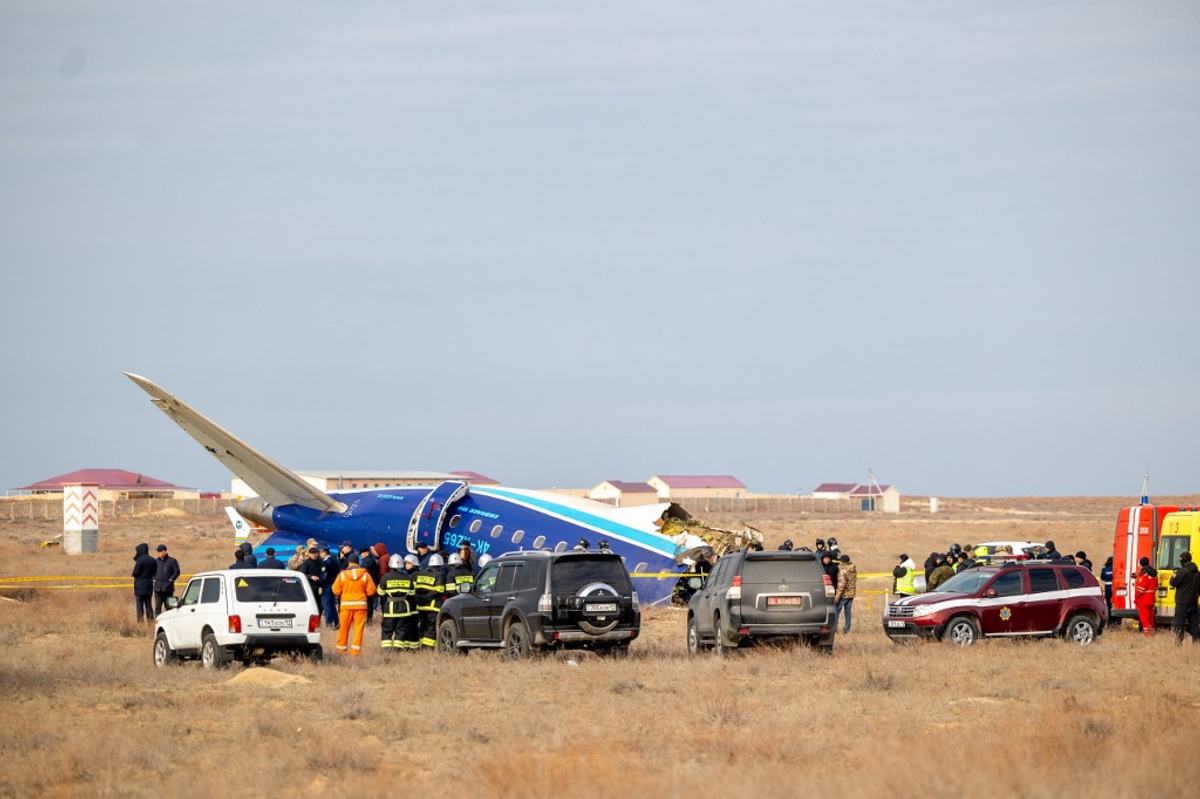Could Russia somehow benefit from shooting down a passenger plane?
Andreas Umland: This was most likely an accident, as it was a passenger plane of a third country, Azerbaijan, which has no direct connection to the Russo-Ukrainian war. The incident probably comes at an inconvenient time for the Kremlin, as Russo-Azerbaijani relations have improved in recent years. The attack on the Azerbaijani aircraft and, in particular, the irresponsible refusal to allow the damaged plane to make an emergency landing inside Russia could now put a strain on these relations.
JOIN US ON TELEGRAM
Follow our coverage of the war on the @Kyivpost_official.
How does this incident resemble the shooting down of MH17 in 2014?
A.U.: There are many differences on the surface, but also some structural and contextual similarities. Three stand out: Firstly, similar to the 2014 catastrophe over eastern Ukraine, it appears that a heavy and high-rising anti-aircraft missile was used in an area where passenger planes fly. It had been already surprising in 2014 that the Russian army was willing to take the risk of mass-killing uninvolved civilians to achieve its military objectives in Ukraine. Now, the Kremlin’s ruthlessness has been illustrated once again.
Secondly, in addition to such general negligence, the irresponsibility towards non-Russian citizens and airlines again stands out, who – like in 2014 Malaysian Airlines and their passengers – have to bear the collateral damage of Russia’s ruthless warfare. In 2024, the Russian refusal to allow an emergency landing for the damaged foreign aircraft makes this recklessness even more obvious. Thirdly, the Kremlin’s excuses in 2024 are as absurd as they were in 2014. While 10 years ago, the Ukrainians were blamed for the downing of a plane flying on high-altitude over a de facto Russian-controlled part of the Donets Basin, in 2024 “bird strike” is said to be responsible for the accident – and thus the Azerbaijani airline itself. It is almost surprising today that Ukraine has not yet been blamed for the shooting of the aircraft over Russia.

Other Topics of Interest
A New Sketchy History of Independent Ukraine
As an assessment of Ukraine’s history over the last 30 years since the country’s independence, Adrian Karatnycky’s “Battleground Ukraine” leaves much to be desired.
How does the downing of the plane impact relations between Russia and Azerbaijan?
A.U.: Over the past four years, Russia has more or less betrayed its official ally in the South Caucasus – Armenia. Moscow has left Yerevan out in the cold during the escalation of the Armenian-Azerbaijani conflict over the disputed territory of Nagorno-Karabakh and instead deepened its relationship with Baku. In some respect, Azerbaijan’s hereditary dictatorship of the Aliyev family resembles the overthrown Syrian regime of Hafiz and Bashar al-Assad. With such autocratic systems of rule, it is difficult to predict the extent to which this shelling and the astonishing refusal of an emergency landing will strain relations between Moscow and Baku.
What consequences or reactions could now follow?
A.U.: The incident is likely to have only some repercussions for air traffic to and inside Russia, but no major political consequences.
It is only hoped that Russia’s shocking behavior regarding the Azerbaijani passenger plane in 2024 will help to illustrate, for people around the world, the modus operandi of Russian warfare. In 2014, Moscow managed to cast doubt on its responsibility for shooting down MH17. To this day, many are still unclear about who was actually to blame back then. Russia’s psychological warfare regarding MH17 extended even to the competent Dutch court, which curiously found that some anti-Ukrainian guerrillas in the Donets Basin, and not the Russian army and its commander-in-chief Vladimir Putin, were responsible for the use of the highly sophisticated and expensive BUK-TELAR unit that shot down MH17.
As of today, much journalistic, legal and scientific work is still needed to come to terms with the tragic and politically significant MH17 incident of 2014.
Dr. Andreas Umland is an analyst at the Stockholm Center for Eastern European Studies (SCEEUS) at the Swedish Institute of International Affairs (UI).

